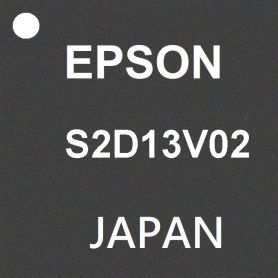Munich, December 1, 2020 – Seiko Epson Corporation (TSE: 6724, „Epson“) has developed and begun shipping samples of the S2D13V02, Epson’s first warning light monitoring IC for in-vehicle display systems. Epson plans to produce 100,000 of the new controllers per month.
The amount of information provided to drivers continues to grow along with the proliferation of vehicle functions, electronics, and automation. The size and resolution of in-vehicle displays are increasing accordingly.
Warning lights that were previously displayed using light emitting diodes (LEDs) are now often incorporated into liquid crystal displays due to dashboard space constraints. Meanwhile, to ensure functional safety1, hazards need to be reduced in the event of display system warning light failures. Warning lights provide drivers with particularly important information and thus need to be correctly shown on LCDs.
The S2D13V02 monitors images streamed from the host (SoC2), and when a warning light irregularity is detected, it notifies the host and, if necessary, performs display processing for example, by overwriting the warning light image or displaying error messages. Even when warning lights are overlaid on images with changing backgrounds, such as on a map display, the IC can check the warning light in images and also detect visibility errors. The S2D13V02 supports the construction of highly reliable display systems with a full range of display safety functions.
Not only does it satisfy the strict quality requirements of the automotive industry, but it is compliant with AEC-Q1003 and operates at temperatures up to 105°C.
Epson seeks to advance the frontiers of industry and drive a circular economy by applying the efficient, compact, and precision technologies that it has developed over many years to solve challenges. These technologies, which save energy, enable smaller products, and increase accuracy and precision, enable Epson to contribute to the Sustainable Development Goals (SDGs), which will bring about a better and more sustainable future for all.
Epson also seeks to leverage its device technologies to realize a smart society. Toward this end, the company will continue to develop a variety of controllers and drivers for in-vehicle display systems that require high resolution and safety functions and that enhance the performance of our customers‘ products.
| Model No. | S2D13V02 |
| Supply voltage | 3.3 V (I/O) 1.8 V (internal core) |
| Input interface | Open LDI-Rx x 1 ch (max. 100 MHz) |
| Output interface | Open LDI-Tx x 1 ch (max. 100 MHz) |
| Supported resolutions | Up to 1920 x 720 |
| Safety functions | Display safety functions |
| Automotive standard compliance | AEC-Q100 |
| Operating temperature range | -40 to +105ºC |
| Other | Image quality correction Warning light OSD |
| Package | PFBGA8-81 (P-TFBGA-081-0808-0.80) |
Please see the link below for product details: https://global.epson.com/products_and_drivers/semicon/products/interface_auto/index.html
1 Functional safety is the realization of an acceptable level of safety by providing functions for ensuring safety. Crossing bar and alarms installed at railroad crossings are often cited as examples of functional safety. Functional safety standards have been established for different industries. ISO 26262 is a functional safety standard for automobiles.
2 A system on a chip (SoC) integrates most or all the functions required for the operation of a system on a single chip. The configuration differs depending on the system, but SoC generally integrate a CPU, memory, and I/O functions.
3 AEC-Q100: The Automotive Electronics Council (AEC) is an industry group that creates standards for the reliability and qualification of automotive electronics. It was formed by the “Big Three” U.S. automobile manufacturers in partnership with major electronic component manufacturers. The AEC standard is a de facto global standard that has been widely adopted as a standard for automotive electronic components.